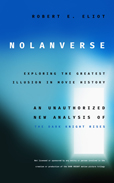
 |
Nolanverse: Exploring the Greatest Illusion in Movie History: An Unauthorized New Analysis of The Dark Knight Rises
by Robert E. Eliot
When it comes to cinema, critiquing a film for what it does and doesn’t do well is standard. However, Eliot’s work forays beyond a standard analysis and really places the grand finale of The Dark Knight Trilogy under a microscope, expertly examining every angle while bringing in numerous Christopher Nolan ventures, like Memento and Inception, to probe the mind of the iconic filmmaker. Eliot’s study unpacks not just the plausibility of Batman’s last-ditch effort to save his beloved Gotham City but also hits on numerous points that define the film, including, but not limited to, technological advancement and Bruce Wayne’s harrowing escape from Bane’s lair.
With almost surgical precision, Eliot guides readers through the parameters of the nuclear blast and a thought-provoking debate on whether Nolan does the unthinkable in killing off Batman, an almost fitting end to Gotham City’s notorious antihero, or if Nolan has pulled off perhaps the greatest illusion in cinematic history. While Eliot starts with the ending, his critique is incredibly comprehensive, demonstrating how multiple parts in the film are relevant to the finale, particularly as it pertains to Bruce Wayne’s psyche.
Interestingly, The Dark Knight Rises is depicted as dystopian from the perspective of a “corrupt state” and science fiction “from a sociological standpoint.” Not unlike his other works, Nolan’s exploration of time weaves seamlessly into Eliot’s analysis. Whether it’s alluding to the Mona Lisa or breaking down the eerie finality of the private funeral with Gordon, there are numerous events and moments frozen in time that speak to the theme of “coming back” in the film. Above all else, the ending of of the movie, in typical Nolan fashion, allows the audience the unique privilege to formulate their own interpretations, essentially taking the finale into their own hands and making it a byproduct of their own experiences.
RECOMMENDED by the US Review